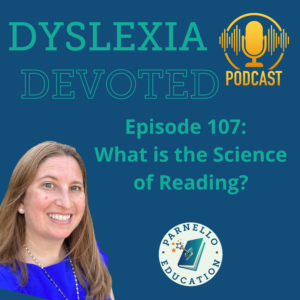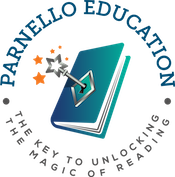
This Episode's Topics:
- What is the Science of Reading
- How it lead to so much talk of phonics
- Science of Reading Summit
Resources Mentioned in this Episode:
Connect with Lisa Parnello:
Speaker 1
00:04
Hello and welcome to Dyslexia Devoted, the podcast dedicated to building awareness, understanding, and strategies to help those with dyslexia. I'm your host, Lisa Parnello, dyslexia therapist and founder of Parnello Education Services. Join me as we dive into today's episode of Dyslexia Devoted.
Speaker 2
00:23
Hello, hello. Welcome to episode 107 of Dyslexia Devoted. I have a feeling this one's going to be a little more short and sweet, because I'm a bit busy and a bit tired this week.
Speaker 2
00:35
And very soon I will be hopping on a plane to go to an annual conference I go to every year. I'm very excited to be able to learn a bunch of new things and get to see my fellow educators in the world of dyslexia and learning differences. And so when I get back from that, I'm sure I will have a bunch of fabulous ideas. So today we're gonna keep the episode a little more short and sweet and with something that you can do to learn a little bit more about science of reading.
Speaker 2
01:02
So that is the focus of today's episode. Number 107, what is the science of reading anyway? Over the last couple of years, it has really gotten a really big push into what is the science of reading and how should we be teaching kids to read? If you haven't listened to it already, the Sold a Story podcast is phenomenal and they've since added episodes if you only listened to it when it first came out.
Speaker 2
01:26
There's a few more episodes now too. I especially like the 1 that mentions a little bit more about dyslexia because the science of reading is essentially what I use to teach kids with dyslexia how to read and how to spell because so many schools were not using evidence-based practices for teaching kids to read for so long and kids with dyslexia have to have it. It is not something that is good for them it is the only thing that really works. And thankfully there has been such a push in these last couple years to get teachers more educated in what it takes to teach kids to learn how to read.
Speaker 2
01:57
Whether you're a child with learning differences or not, The same methods and strategies work really well. It's really more about the intensity and how many kids are working together at a time and the pace that you're going at that usually makes the biggest difference. A lot of it in terms of the strategies that you use to teach kids is actually the same, whether or not they have learning differences or not. If you have quality reading instruction, kids will learn how to read.
Speaker 2
02:20
Which is why I'm so excited to be participating in the Science of Reading Back to School Summit, which is happening this month. It is meant for educators, but I'm sure it won't hurt if any of you guys are parents and want to learn more about the science of reading. I will link it in the show notes where you are listening to this, as well as my weekly newsletter, or if you are not part of either 1 of those and want just a direct way to get there, if you just go to parnelloeducation.com forward slash episode 107, That will take you to the registration page if you want to sign up to attend the Science of Reading Back to School Summit. So essentially, the Science of Reading really breaks down into 5 pillars of reading instruction.
Speaker 2
03:02
And where it falls apart is that some of these pillars were not being taught in a lot of schools for many, many years. Many schools were pushed into curriculums that seemed like a great solution, and really they were more temporary fixes. It is where so many kids learn to look at a picture and guess what the word is instead of actually learning how to read the word, which means as soon as you finish second or third grade and you stop having picture books, then you suddenly have no idea how to read once you hit fourth grade, which is 1 of those, 1 of many reasons why kids seem like they're okay in the early grades and then all of a sudden they hit a wall in fourth grade. Some of it really is that you go from learning how to read to reading to learn, but also some of it is that kids were learning how to guess.
Speaker 2
03:46
They weren't really learning how to read. And so with the push of the science of reading, there's 2 pillars specifically that I've noticed getting a lot more attention, which are phonemic awareness, being able to hear and manipulate sounds, and phonics, meaning the letter rules and things that we use in order to read and spell and know how to pronounce things. Many years we've seen a lot of focus on fluency and vocabulary and comprehension and those pillars were not quite so neglected. But vocabulary, you know, there's always more that we could do.
Speaker 2
04:17
There's a lot of schools that haven't taught anything about morphology because if you're someone like me, you never even learned about morphology in school. Definitely knew the Greek and Latin roots were a thing, but definitely never learned any of them growing up. So when we get into the science of reading, that's where we've seen a really big push into more about phonics. And I know phonics is not all that science of reading is, but it's the piece that has been the most neglected.
Speaker 2
04:41
People will tend to use the science of reading as like a catch-all term, and what they really are talking about is phonics. And it's mostly because a lot of kids were not explicitly taught phonics rules. They were never taught why our letter patterns work the way that they do. A lot of us just say, well, English is crazy.
Speaker 2
04:59
None of it makes sense. There's no real rules anyway. There's always exceptions and whatever But once you start learning about it, there really are a lot of very concrete rules that are pretty solid and The things that seem like exceptions aren't really exceptions. There's actually a reason behind them and there's a logic behind them But none of us were taught them, so therefore we all think it's crazy and none of it makes sense.
Speaker 2
05:20
But it's really about with good concrete instruction we can make sense of it. There's actually a really strong logic to most of it. There's only a few words that I can give kids that I often don't have a good reason for. And oftentimes it turns out that it's French and they use very different letter combinations in French spelling than we do in English spelling.
Speaker 2
05:40
And so sometimes it's when we've pulled from another language that something ends up being a little different. But if you can teach kids some of these language origins, they start making a whole lot more sense. So if you would like to learn even more about the science of reading, please join me at the Back to School Science of Reading Summit and I will provide the link to you down here where you are listening. You should be able to scroll and be able to click the link to register for that.
Speaker 2
06:05
The way this back to school summit works is that the summit is live July 29th through 31st, and you can get it with a free ticket and each video is only available for 24 hours. And then you will also be able to upgrade your ticket to be able to get all access so that way you can watch it on your own schedule because I don't know about you but I'm actually pretty busy this summer teaching a bunch of kids and the all access pass is great because then you will have more than 24 hours to watch all the episodes and learn from all of these amazing resources. Okay, that is it for today. Our quickie recap is that in recent years, there's been a big push of the science of reading.
Speaker 2
06:45
1 of the things that has been a big wake up call for both parents and educators is the Sold a Story podcast. If you haven't listened to it, go listen to it. It's a limited release thing. I believe there's like 8 to 10 episodes.
Speaker 2
06:56
I don't remember because they released more after it was initially put out. They had some follow up ones because of how amazing the feedback was on it. And then there's also the back-to-school Science of Reading Summit that I am participating in. So I'm doing a session on dyslexia for beginners and there's a whole bunch of other sessions that you can participate in all related to the science of reading.
Speaker 2
07:17
And you can grab your ticket with the link down below and I highly encourage you to do the upgraded pass because then you can have access for an unlimited amount of time because every time I sign up for 1 of these little summits I think I'm gonna watch the things within the 24-hour window and I never do. I never get to all the ones I wanna watch. So I'm a big fan of those all access passes for all these learning things. Am I the only nerd that loves to just keep learning all the time?
Speaker 2
07:41
Anyway, so have a fantastic rest of your day. All right, so I'm going to wrap up here so I can finish teaching some kids today and a few days from now hopping on a plane to go to an annual meeting that I do every year working with other educators who specialize in kids with dyslexia. So I'm sure I will have some great things to share with you when I get back. See you next time!
Speaker 2
08:07
Thanks for tuning in to today's episode. If you want to learn even more about dyslexia, check out parnelloeducation.com forward slash courses. See you next time.
